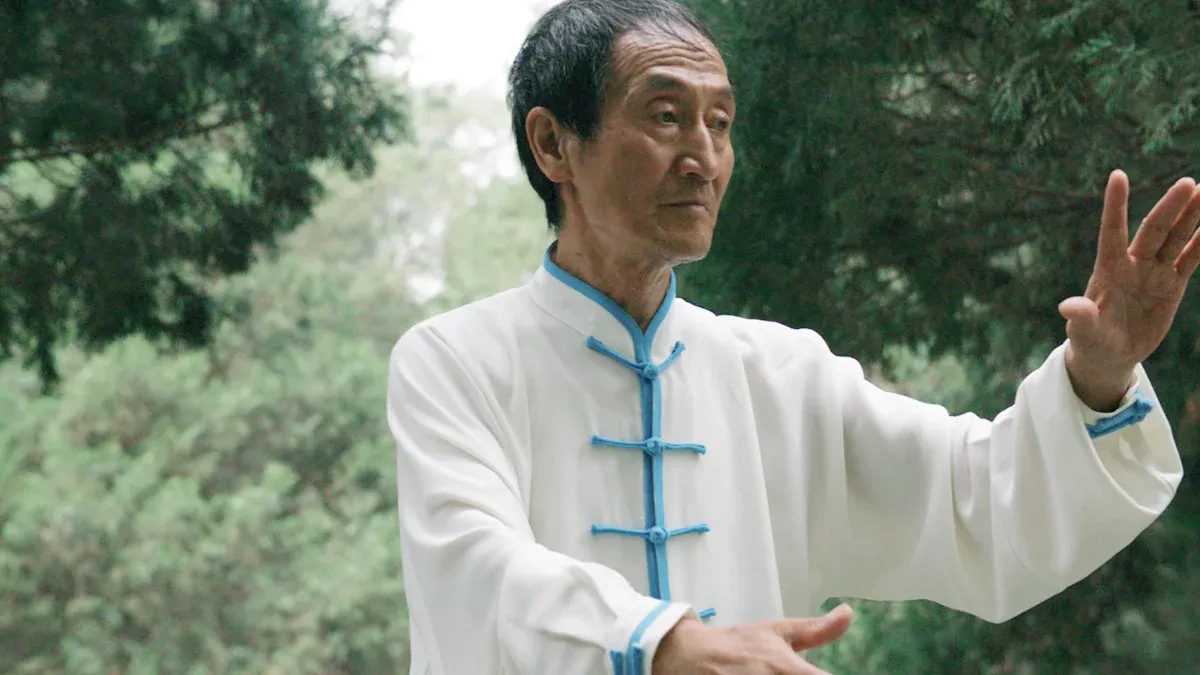Go Beyond the Guidebook with a Tai Chi Morning Class in Parks China
Travelers often seek a true connection with local life. A morning in China offers a simple, profound answer. A tai chi morning class in parks china provides this authentic link. Recent data shows a major shift in travel preferences. More visitors now desire heritage-rich, immersive experiences over simple sightseeing. Nearly 250 million people practice Tai Chi globally for its wellness benefits. This quiet park ritual allows travelers to join a living tradition, finding both cultural connection and a moment of peace.
Key Takeaways
Join a morning Tai Chi class in a Chinese park for a real cultural experience. You can see local life and find peace.
Find Tai Chi groups in big city parks between 6 AM and 9 AM. Look for people moving slowly together.
Show respect by watching first, then try to copy the movements. Wear comfortable clothes and flat shoes.
Tai Chi helps you feel less stressed, improves your balance, and makes your brain healthier.
For a deeper experience, consider a Tai Chi retreat at Wudang Mountain. You can learn from masters there.
Your First Tai Chi Morning Class in Parks China
A traveler’s first encounter with a tai chi morning class in parks china is a memorable sensory experience. It connects them to the city's quiet, rhythmic pulse before the day's hustle begins. This experience offers a unique window into local life and community wellness.
The Morning Atmosphere
The air feels cool and fresh as the sun begins to rise. A city like Beijing or Shanghai slowly awakens. In the green spaces, a different kind of energy unfolds. Groups of people move together in slow, deliberate harmony. Their synchronized forms create a mesmerizing sight against the backdrop of ancient trees or modern skylines. This peaceful scene is common in many of China's most famous public parks.
Traveler's Tip: Some of the best places to witness this morning ritual are major urban parks. Travelers often find vibrant scenes in these locations:
Temple of Heaven Park
Summer Palace
Beihai Park
Jingshan Park
These parks transform into open-air wellness centers. The quiet focus of the participants offers a stark contrast to the city's usual pace. It provides a moment of tranquility for both observers and practitioners.
The Community Spirit
The groups practicing Tai Chi are often informal and welcoming. They consist of a wide range of ages, but older adults make up a significant portion. More than 50% of park users in the morning are seniors. These dedicated individuals, sometimes affectionately called 'Kung Fu Grandpas' and 'Grannies,' display remarkable flexibility and strength. They gather before 10 a.m. for their daily practice.
This shared activity builds a strong sense of community. Participants find companionship and motivate each other to attend regularly. The practice fosters a sense of togetherness and a renewed purpose. Many report that their social networks broaden after joining a group. They share stories, laugh together, and develop a deep commitment to their shared wellness journey. This quiet, focused gathering creates a peaceful environment that invites respectful observation.
A Practical Guide to Joining In

Joining a public Tai Chi session is easier than many travelers think. It requires a little planning and a lot of respect. This guide provides simple steps for finding a group and participating in a way that honors the local culture.
Finding a Group
Finding a group for a tai chi morning class in parks china is part of the adventure. Travelers should plan to visit major city parks early in the morning.
Best Time to Go: The ideal time is between 6 AM and 9 AM. Parks come to life during these hours. Older residents often practice Tai Chi to wake up their bodies and loosen their muscles for the day.
What to Look For: Scan the park for groups of people moving slowly and in unison. Their movements are fluid and synchronized. Sometimes, you may hear soft, traditional music playing from a small speaker.
Where to Look: In large parks like the Temple of Heaven, groups often gather deeper inside, away from the main entrances. Tai Chi masters frequently meet their students in these central, quieter areas.
Pro Tip for Planners: While most groups are informal, some resources can help. The China Tai Chi Guide website lists teachers and schools in major cities like Beijing and Chengdu. It helps travelers find dedicated practitioners in the area.
Respectful Participation
Once a traveler finds a group, showing respect is the most important step. Locals are generally welcoming to quiet observers and participants who show genuine interest.
Observe from a Distance: First, stand at the back or side of the group. Watch the movements and get a feel for the group's energy. Avoid walking through the middle of the practice area.
Show Your Interest: A simple smile and a nod can go a long way. This non-verbal communication shows you appreciate their practice and are not there to intrude.
Mimic the Movements: After observing for a while, you can try to follow along from your spot at the back. Start with the basic hand and leg movements. Do not worry about getting it perfect. The goal is to participate, not to perform.
Dress for Comfort and Movement: Wear clothing that allows you to move freely.
Pants: Loose joggers, yoga pants, or wide-legged cotton pants are excellent choices. They allow for deep stances and good blood flow. Avoid pants that are too long, as they can cause tripping.
Shirts: A loose-fitting t-shirt or a long-sleeved shirt works well. Comfortable clothing is key.
Footwear: Wear shoes with thin, flat soles for good balance, like martial arts shoes. Socks with grip soles are also a good option.
Following these simple etiquette rules ensures a positive experience for everyone. It allows a traveler to respectfully join a beautiful and authentic cultural tradition.
From Park Practice to Spiritual Retreat
A single morning of Tai Chi can spark a deep curiosity. The peaceful movements and quiet focus leave a lasting impression. For travelers who feel this connection, a structured retreat is the natural next step. It transforms a brief encounter into a profound journey of personal growth.
Deepen Your Practice
A dedicated practice offers benefits far beyond simple relaxation. It is a path to holistic well-being. Studies show that a consistent Tai Chi regimen can lead to significant improvements in health.
Reduced Stress: The practice calms the mind and lowers anxiety levels.
Better Balance: It strengthens the body and can reduce the risk of falls by up to 50%.
Improved Brain Health: Daily practice enhances memory and higher-level thinking skills.
Travelers seeking these deeper benefits can turn to a trusted agency. China Explorer Tour specializes in authentic spiritual retreats, known as 旅修 (lǚ xiū). The company designs immersive journeys that connect visitors with China’s ancient wellness traditions.
The Wudang Mountain Retreat
The ultimate immersion awaits at Wudang Mountain. This UNESCO World Heritage site is the legendary birthplace of Tai Chi. Here, travelers can learn from true Taoist masters. China Explorer Tour offers a 3-Day Taoist Retreat at Wudang Mountain for this purpose. This experience goes far beyond a tai chi morning class in parks china. It is a complete spiritual exploration.
Participants learn the core principles of Taoism, such as harmony and simplicity. The retreat helped Janet, a traveler from Oregon, find relief from chronic shoulder issues and gain immense spiritual enrichment. Another participant described the journey as a life-changing experience.
"One of the best and most fulfilling travel experiences—not only of my time in China, but of my whole life." — Lance, Wudang Mountain Retreat Participant
This retreat offers a unique opportunity. Travelers can heal their bodies, restore their minds, and connect with an ancient practice at its very source.
A tai chi morning class in parks china offers a tranquil cultural experience. Deeper journeys are available for travelers seeking more. A single morning or a dedicated retreat with China Explorer Tour enriches any trip. Travelers connect with ancient wellness practices that improve:
Balance and flexibility
Muscle strength
Overall well-being
This connection to wellness tourism is a growing part of China's appeal. Travelers can embrace the calm. They can find their own moment of peace for an hour or for three days.
FAQ
Is it free to join a Tai Chi class in a park?
Yes, most informal park groups are free to join. Travelers can simply find a group and follow along respectfully. Some parks may require a small entrance fee, but the Tai Chi practice itself usually has no cost.
Do I need to speak Chinese to participate?
No, speaking Chinese is not necessary for these informal sessions. A smile and polite gestures show your interest. The focus is on shared movement, not conversation. Locals often appreciate the quiet participation of visitors.
What if I have no Tai Chi experience?
Beginners are very welcome. Travelers should stand at the back or side of the group. They can observe first, then try to mimic the basic movements. The community values participation over perfection, creating a supportive atmosphere.
See Also
Your Ultimate Guide To Exploring Beijing's Historic Beihai Park
Discover Authentic Chengdu Tea Houses Near People's Park
Navigating Your Way To Beigong National Forest Park
Jingshan Park: Best Walking Routes And Photography Advice
An Easy Guide To Exploring Suzhou's Beautiful Lingering Garden
